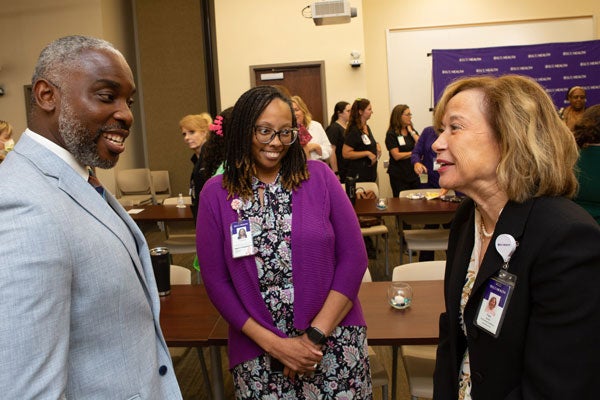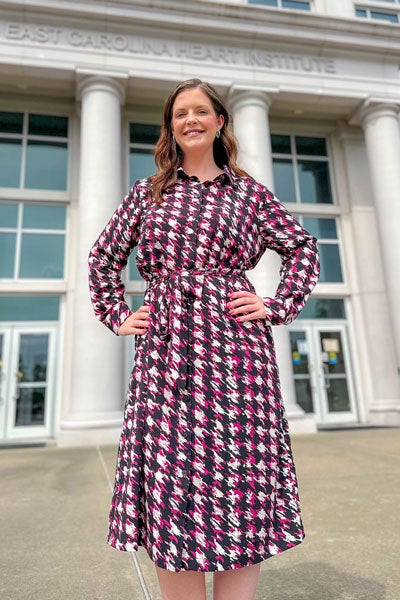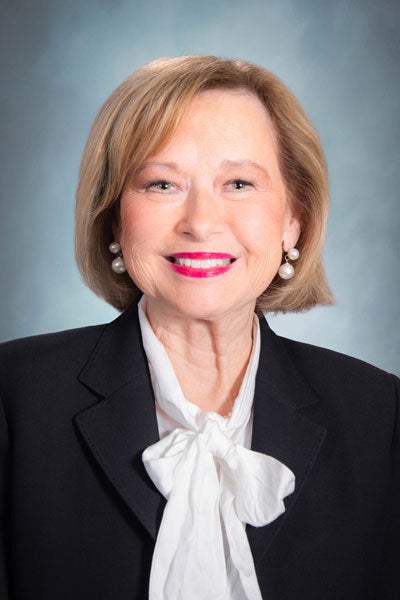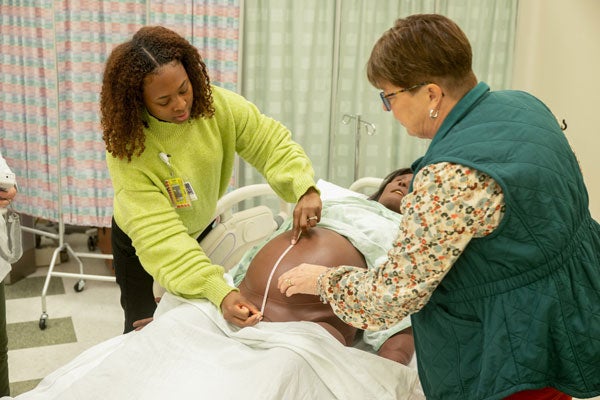Nurses take the lead in health care innovation with DNP-MBA
Earlier this year, Ashley Elks became the first person to embark on East Carolina University’s newest graduate program, a dual-track Doctor of Nursing Practice and Master of Business Administration that will see graduates prepared to excel at the highest levels of health care leadership, to bring lasting change to North Carolina.

Dr. Pam Rudisill, ECU Health’s vice president of nursing excellence (right), speaks with Dr. Bim Akintade, dean of the College of Nursing, and Tywanna Purkett at a graduation ceremony for student nurses who participated in an extern program at ECU Health clinics.
Dr. Kimberly Hunter, the interim CEO of the University of Iowa Hospitals, recently argued that because the nursing workforce is overwhelmingly female, and only 17.5% of health system chief executive officers are female, the number of women in senior leadership positions is scant. The vacuum of female leadership is exacerbated by polling that shows that only 1 in 10 nurses — of nearly 4.3 million registered nursing in the country, according to a 2024 report from the American Association of Colleges of Nursing — have plans to pursue increased positions of authority.
Dr. Mary Jo Nimmo, director of the College of Nursing’s nursing leadership program in the Department of Advanced Practice Nursing and Education, said she has spoken with nurses in leadership roles who have relayed to her the importance of having not only the bedside leadership skills, but also the academic qualifications to have a seat at the upper management table.
For the business side of health care, Nimmo said, nursing is the largest personnel expense, with nurses making up as much as 80% of the workforce. The benefit of the DNP education, coupled with gaining specific skills in leadership and quality improvement, is the development of nurses who can advocate for the other members of the profession.
Taking the Next Step

Ashley Elks is the first member of the College of Nursing’s dual DNP-MBA program.
Elks is from Winterville and a nursing family; she grew up knowing she would follow in her mother’s footsteps. She graduated from East Carolina University’s College of Nursing in 2011 and went straight to work as a bedside nurse, where she stayed for six years.
“Then I made a big leap and went straight from bedside cardiac nursing to be the leader of the stroke program. It was one of the most rewarding times in my career, leading that program,” Elks said.
In 2018 she felt ready to return to school and completed her master’s in nursing leadership from UNC Charlotte, at the height of the Covid-19 restrictions. During that same time, she started her first business, a hydration and wellness clinic, which she sold in 2022. She continued in nursing administration in the human resources department at ECU Health Medical Center before starting a second enterprise, a health care consultation business that focuses on workplace culture.
“I like building work environments where nurses thrive,” Elks said.
Last year, during a meeting with the dean of the College of Nursing, Dr. Bim Akintade, she was presented with an intriguing new program that would meld her two passions — nursing and business.
“He said we’re going to do a DNP-MBA, and I said that’s right up my alley,” Elks remembered. “It just made sense to do them together, so I enrolled the next day.”
The Program and the Need

Pam Rudisill is a vice president of nursing excellence at ECU Health.
The College of Nursing launched a dual Master of Science in nursing and Master of Business Administration degree program in 2023. Currently, 16, students are enrolled in that track, and the first graduate should walk across the stage in 2027.
But a gap remained for nurses who already have a graduate degree and are looking to take a similar next step. The College of Nursing is offering a dual MBA and Doctor of Nursing Practice program that will require the same content from the business school and will ask students to take the same classes as traditional DNP students.
Dr. Julie Linder, chair of the college’s Department of Advanced Practice Nursing and Education, said nurses have traditionally not been seen as businesspeople, but the new program will help to change that perception.
“As a nurse, you never forget where you come from, so the things that a nurse with an MBA might implement would be different than someone who has no nursing experience,” Linder said.
Linder believes the importance of bridging the worlds of business and nursing is improved by providing working nurses in administrative positions with opportunities to engage with cutting edge research, and conduct research themselves, that can be disseminated into the nursing workforce to improve conditions for patients in real time.
“Typically, research takes anywhere from 10 to 15 to 20 years to get from development to practice,” Linder said.
Nimmo agrees. She said nurses haven’t been known for proving a return on investment from their research, but she believes that aspect of the profession is changing.
“Our dream is for these people get their MBAs, gain some knowledge around finance along with quality improvement and combine that with their experience. It’s going to be interesting to watch,” Nimmo said.
Health Care Transformation and Role of Nurses
Nimmo said many physicians are now getting MBA degrees to be competitive in the independent business world, and to improve operations within large health care systems.
“A lot of them will take a year off from residency to get their MBA, so this allows us to be at the same table with those physicians,” Nimmo said.
The benefit to patients from the combination of nursing and business expertise is an enriching of the art and science of a caring profession. Linder said nursing is more than black and white on a spreadsheet — there are emotions, feelings, sadness, happiness and relief: “all the things patients go through and experience just to know that there is a nurse looking out for them.”
Nimmo acknowledged that in some instances there is room for belt tightening in health care settings, which the business classes will help future program graduates to discern.
“Understanding that we may need to cut some resources, or maybe we’re overdoing some things, is brought into the light so that we can afford to take care of the patient into the future,” Nimmo said.

A DNP student and faculty member of the College of Nursing practice nursing skills in the college’s clinical labs.
Pam Rudisill, vice president of nursing excellence at ECU Health, has been a nurse since the mid-1970s, and she has worked in health care administration in large health systems in North Carolina, Tennessee and Florida. She said the academic-practice partnership between ECU Health and the College of Nursing is unlike any she has experienced previously and is setting the standard for how universities prepare nurses to be leaders in medicine.
“From a nursing standpoint — the innovation, the strategy — we already have some of that within the structure of ECU Health as a whole thanks to the leadership of Dr. Trish Baise, our chief nursing executive, but to have that expertise from (Elks’s) studies will be very beneficial as well,” Rudisill said.
And it’s not just the main hub of the hospital in Greenville that benefits from nursing leadership. Rudisill said ECU Health has many nurses in executive leadership positions across the system, including the presidents of ECU Health Beaufort Hospital and ECU Health Edgecombe Hospital.
ECU Health has long demonstrated confidence in nurses as leaders; the hospital system’s chief operating officer is a nurse. Rudisill believes having Elks, a nursing leader from the system who is an active part of the College of Nursing’s alumni association, as the first to tackle the dual degree program will provide a feedback loop between the school and the hospital, which will improve learning outcomes for future DNP-MBA program students.
“This is a new program, so Ashley can evaluate it and say, ‘This part of the program was great, but maybe look at this, this and this.’ As we move forward it will be a continuum,” Rudisill said. “To have expertise with both elements — nursing practice and business sense — is important. It gives nurses the opportunity to grow into the roles of the future.”
Elks said nurses are trained to be problem solvers from day one of nursing school, that it’s “in the DNA of nurses to solve really complex problems.”
Elks believes health care is transitioning to a population health model, where telehealth and routine care visits will take the place of long waits in hospitals, and nurses will be on the frontlines of that revolution.
“We’re going to get to the place that you only come to the hospital if you need a surgeon,” Elks said, but she knows to get there, nurses will need a complexity of skills to lead at the bedside and in the boardroom.
The evolution of health care is happening at breakneck speed, and Elks said she wants to be at the helm of the radical transformation that is sorely needed to make health care more accessible, while at the same time being cognizant of the fiscal realities of the business of health care.
“It is really important to have an academic background to build your credibility, to navigate these spaces. When you’re talking about women in business, which is a whole other layer, you need to have street cred,” Elks said. “When you’re a nurse having really tough conversations about productivity and staffing models and finance, it helps to have an MBA.”